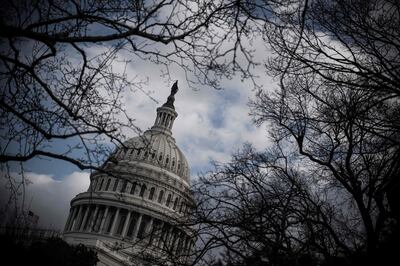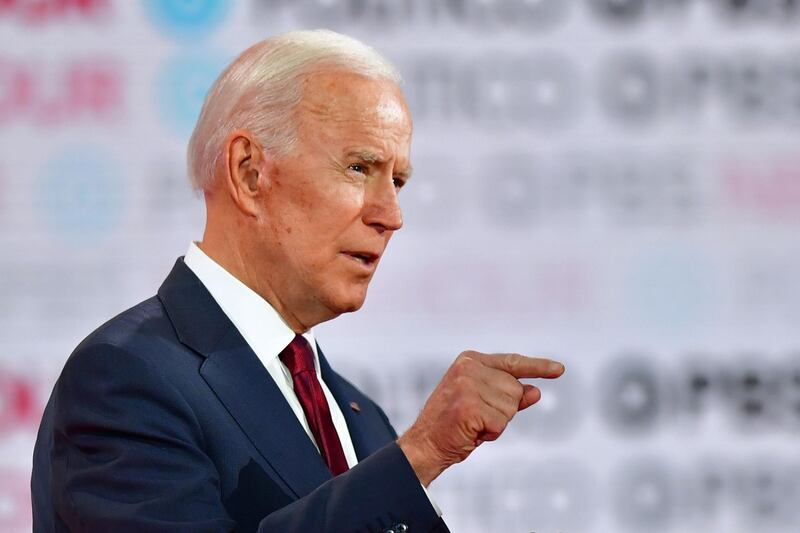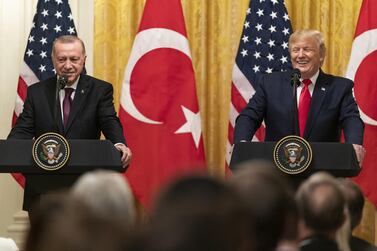As tensions between the US and Iran heat up over the killing of Iranian commander Qassem Suleimani in Baghdad on Friday, the Democrat Party is trying to politicise the potential of a war between the two countries. It has a good shot at making the issue a stone around President Donald Trump's neck but it has far fewer answers as to how to handle the actual challenge of Iran. That lack of strategy is likely to embolden an Iran that is watching America's electoral calendar carefully and the Iranians will conclude that the Democrats' lack of a realistic strategy is an opportunity for them.
The recent introduction of a War Powers Resolution designed to prevent conflict with Iran by the Democratic-held House of Representatives is already dead in the water. It is not just that the Republican-led Senate will not pass their own version; it is also that the War Powers Resolution has never truly been tested and Congress has spent decades since the Second World War deferring war-making powers to president after president. So the resolution is more about politics than policy.
That politics has meant Democrats have focused on a combination of attacking Mr Trump and talking up diplomacy. Elizabeth Warren, a leading 2020 presidential election contender, accused Mr Trump of “taking us to the edge of war” to distract from impeachment. Bernie Sanders used more idealistic language. “Maybe what we should be doing is figuring out how as a planet we work together instead of going to war with each other,” he said. Joe Biden, the former vice president who was part of the Iran nuclear negotiations under then president Barack Obama in 2015, called Mr Trump “erratic” in the wake of the Suleimani killing.
Left unsaid is what any of them would do if they were president to de-escalate with Iran beyond simply returning to the nuclear deal, which Mr Trump pulled the US out of in 2018. After all, this is the strategy favoured by most Democrats. But that is a strategy based more on nostalgia than reality. The nuclear deal has been deeply undermined by both sides. Trust is shattered.
Emblematic of this broken trust is the problem with even getting negotiations started again. The Iranians are demanding the end of sanctions before they return to negotiations. Yet the Democrats are not clear whether they would give Tehran this kind of relief as a good-faith first step – and it is even less clear that even if sanctions ended, the Iranians truly would return to the deal.
That is just the first hurdle that awaits Democratic policymakers. Proxy conflicts, a fresh record of violence by both sides and a heightened Israeli-Iranian conflict are all new or increased obstacles to getting Iran and the US back to their rosier Obama-era relations.
The proxy conflicts in Syria, Iraq, Yemen and Lebanon are largely ignored by the Democrats. Each one involves a layer of Iranian, American, regional and local interests, and – with the exception of recent diplomatic progress in Yemen – each now is enduring greater strain because of the confrontation. Iranian proxies such as Hezbollah in Lebanon, the Houthis in Yemen, or Kaitab Hezbollah in Syria and Iraq pose a lasting threat to US allies and interests. The Obama administration chose to ignore them in the negotiations that led to the 2015 deal; that is no longer nearly so easy. Since the deal was signed, Israel began actively attacking Iranian proxies in Syria, Lebanon and Iraq, Houthi rebels were emboldened to overrun Sanaa kicking off a regional war in Yemen, and Iraqi proxies began attacking US forces in Iraq. Those new conflicts need to be addressed as part of a broader US-Iran rapprochement.

There is also new blood spilled since the deal was signed – most recently of Suleimani, and likely to involve more casualties if cycles of retaliation take hold. As that cycle plays out over the year, the Democrats will have to contend with a record of casualties that might include Americans – and it is unclear whether American domestic politics will back a diplomacy-first strategy if that happens. That also extends to the Iranians. In short, Suleimani’s death will haunt US-Iran relations for many years to come.
Finally, the Democrats rarely address the real problem of Israel’s anti-Iranian strategy. Israel has become considerably more aggressive in the Trump era. That is in part because of Mr Trump’s backing, but it is also because Iran is a more advanced opponent than it was under Mr Obama – with more proxies, more missiles and rockets, and a programme that remains able to eventually develop a nuclear weapon. While Democrats may criticise Israel for increasing tension, that criticism is not enough to really change Israel’s strategy, as it sees Iran as a growing existential threat. If Israel’s concerns are not addressed, there is a very real chance any American outreach to Iran could be upended by an Israeli strike on Iran’s allies or Iran itself.
These gaps in Democrats’ diplomacy first strategy are an opportunity for the Iranians. They see a party that, for domestic political purposes, wants to quickly fast-track diplomacy and might be willing to cede ground in order to avoid confrontation. That will make Tehran more likely to try to play America’s domestic politics to its own ends. In the short term, that will make the Iranians want to avoid a major conflict with the US that could prematurely upend the Democrats’ diplomacy first strategy.
But in the long run – especially if the Democrats do take the White House in 2020 – it will make the Iranians aggressively exploit Democratic sentiment to avoid conflict. Democrats will need more substantial answers to the challenge of Iran if they are to maintain America’s standing in the region.
Ryan Bohl is a Middle East and North Africa analyst at geopolitical risk consultancy Stratfor, focused on regional strategy, security, politics and social contracts






